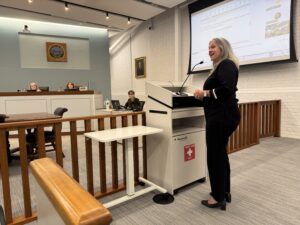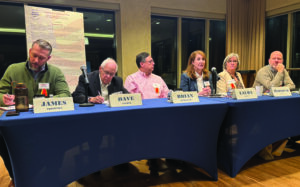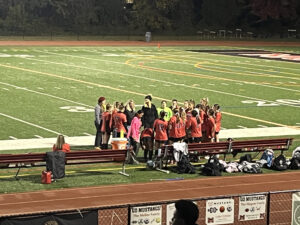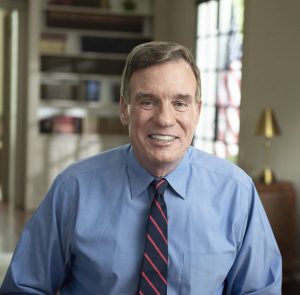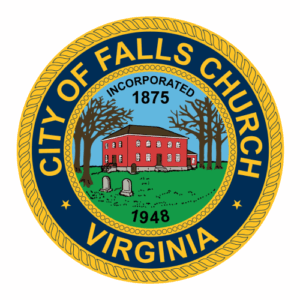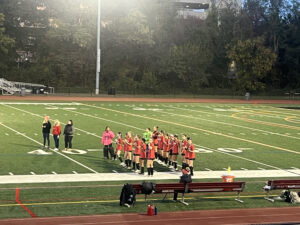Next Tuesday, Nov. 4, the eyes of the entire world will be zeroed in on Virginia to see how the U.S. electorate will react to what Donald Trump is doing to dismantle democratic institutions and make huge cuts to the living standards of average Americans.
While three statewide offices, including governor, attorney general and lieutenant governor and all 100 state delegate slots will be on the ballot, including in Falls Church, at home in Falls Church important races for City Council and School Board are also on the ballot.
Of course, going into election day, F.C Registrar of Voters David Bjerke reports that a whopping 2,898 Falls Church voters, or 25.7 percent of all registered voters in the City, had already cast their ballots as of close of business this Tuesday, Oct. 28. Voters will have until 5 p.m. Saturday to cast early ballots if they so choose.
But long, hard campaigns of Falls Church’s candidates will culminate with long days standing in front of polling locations Tuesday. There are three wards in the City but two voting locations that will be open from 6 a.m. to 7 p.m.
In the City Council race, all six candidates seeking to fill four (of seven) vacant seats were on hand for a final face-to-face event at the community room of the 301 W.Broad apartments above the downtown Harris-Teeter last week.
Again, the dividing line was between those who contend the current Council has been effective and those who don’t. Incumbents Downs and Connelly spoke strongly in favor of results to date, and incumbent Snyder less so but overall in support.
Challengers Agin, Thompson and Pendleton focused more on what the Council hasn’t accomplished, though Agin said everything that’s happened so far he supports while holding out concerns for where we go from here.
Pendleton was more critical, especially of the revenue-sharing agreement between the City and the schools, and Thompson, who first moved into Winter Hill 12 years ago around the time the final nails were being driven into a proposed senior affordable housing project nearby that wound up never getting built, repeated his primary assertion that a “pause” in development is needed in the City.
Viewed from the perspective of growth vs. no-growth, Connelly and Downs are on the side of the former (with all due caveats for appropriateness) while Snyder and Agin fall in the middle and Pendleton and Thompson on the no-growth side, though no candidate would admit fully to those characterizations.
But the question matters in terms of the tax rate, with pro-development proponents pointing out that 17 cents has been chopped off the real estate tax rate in recent years due to the tax and permit revenues that have come from development here, putting the City in far better fiscal shape as economic storm clouds gather than her neighbors. The development has also helped provide for 99 affordable housing units with no limits on their duration.
The development projects have also paid for a $120 million state of the art new high school and major renovations of City Hall and the library, while helping produce a $2.1 million budget surplus this year a big part of which will be available for the City to meet the special needs of residents due to the current sharp economic downturn.
The question will also matter, the candidates noted, when the next big question arises on how to develop the so-called Gordons Road Triangle, where the City owns a major chunk, the Beyer family a major chunk, and overall as much as 20 acres is susceptible to development.
In a development late yesterday, Registrar Bjerke announced that the polling location at Oak Street Elementary on Nov. 4 will be moved to a trailer at the S. Oak St. location due to minor construction activity at the school.
Meanwhile, on the statewide level, while Falls Church’s 13th District state delegate representative Marcus Simon is expected to win handily, the outcome of the 99 other state delegate races will be critical.
Not only will they matter for overall control of the House of Delegates, where Democrats currently hold a hair-thin majority, but in terms of their immediate plans to do a major redistricting of the 11 congressional district boundaries in the state in time for the midterms next year, a process being launched with a special session in Richmond this week. The plan would come before a special vote of citizens next April, but it is assuming Democrats retain control of the House, and also would happen only if Republicans proceed with their plans to do similar redistricting in their favor in other states.
The measure passed the House by a 51-42 vote yesterday (Wednesday) and the State Senate will vote on it Friday.
Meanwhile, a new Wason Center of Christopher Newport University survey of Virginia’s likely voters shows tightening races across the statewide contests. For governor, Democrat Abigail Spanberger leads Republican Winsome Earle-Sears by 7 points, 50 percent to 43 percent. For lieutenant governor: Democrat Ghazala Hashmi leads Republican John Reid by 2 points, 47 percent to 45 percent. For attorney general, Republican Jason Miyares now leads Jay Jones by 1 point, 46 percent to 45 percent, following reports of a 2022 text messaging scandal involving Jones.
In the House of Delegates generic ballot, the Democratic Party candidates lead the Republican Party candidates by 8 points, 51 percent to 43 percent.



